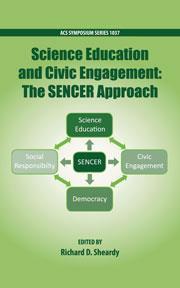Keith S Taber reviews this guide to teaching science in a different way
Science education and civic engagement: the SENCER approach
Richard Sheardy (ed)
Washington DC, US: OUP USA 2010 | Pp224 | £95 (HB) | ISBN9780841225534
Reviewed by Keith S Taber

The title may not readily attract the attention of chemistry teachers, but this book is actually about teaching science in a way which relates it to the needs and concerns of society.
Teaching about socio-scientific issues is already well known at school level, for example in the ASE’s Science and technology in society project. The present volume however focuses on undergraduate level and a programme called SENCER: Science education for new civic engagements and responsibilities. This is sponsored by the National Science Foundation, and seeks to support the development of courses in different institutional contexts through a structure for networking and sharing ideas and approaches.
It is intended that this programme will help course teams prepare courses ‘that teach “to” science and math “through” the complex, capacious and largely unsolved civic challenges of our day’. This reflects worldwide debates about how science education should provide the science needed for all future citizens, and not just the science required to do more science.
In the US context there is an aspiration for all undergraduate students to include some study of STEM subjects as part of their degree programmes, and many of the examples discussed in the book are from courses expected to be primarily attended by non-majors, but there are also examples of innovations within courses aimed at science majors.
The book is interesting not just for the examples it offers (mainly linked to environmental issues), but for its points about the value of the pedagogy employed in relation to student motivation and engagement in authentic learning, and should prove especially thought-provoking for those looking for ways to innovate teaching within degree programmes.
Related Links
Science education and civic engagement: the SENCER approach
Purchase this book from Amazon.co.uk






No comments yet